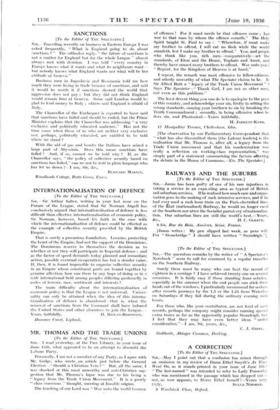INTERNATIONALISATION OF DEFENCE
[To the Editor of THE SPECTATOR.] Stn,—,Sir Arthur Salter, writing in your last issue on the Future, of the League, stated that Sir Norman Angell has conclusively argued that internationalisation of defence is less difficult than effective internationalisation of economic policy. Sir Norman, however, based his faith in the ease with which the internationalisation of defence could be effected as the example of collective security provided by the British Empire.
That is surely a precarious foundation. Locarno, protecting the heart of the Empire, had not the support of the Dominions. The Dominions reserve to themselves the decision as to 'whether or not they will participate in Imperial defence ; and as the factor of speed demands today planned and inimediate action, possible eventual co-operation has but a slender value. If, then, it is found impo-ssible to organise collective security in an Empire whose constituent parts are bound together by genuine affection, how can there be any hope of doing so in a wide international field among peoples differing profoundly in codes of honour, race, sentiment and interests ?
The main difficulty about the internationalisation of economic policy is that the League is not universal. Univer- sality can only be attained when the idea of this interna- tionalisation of defence is abandoned—that is, when the removal of sanctions from the Covenant shall have induced the United States and other absentees to join the League.—










































 Previous page
Previous page